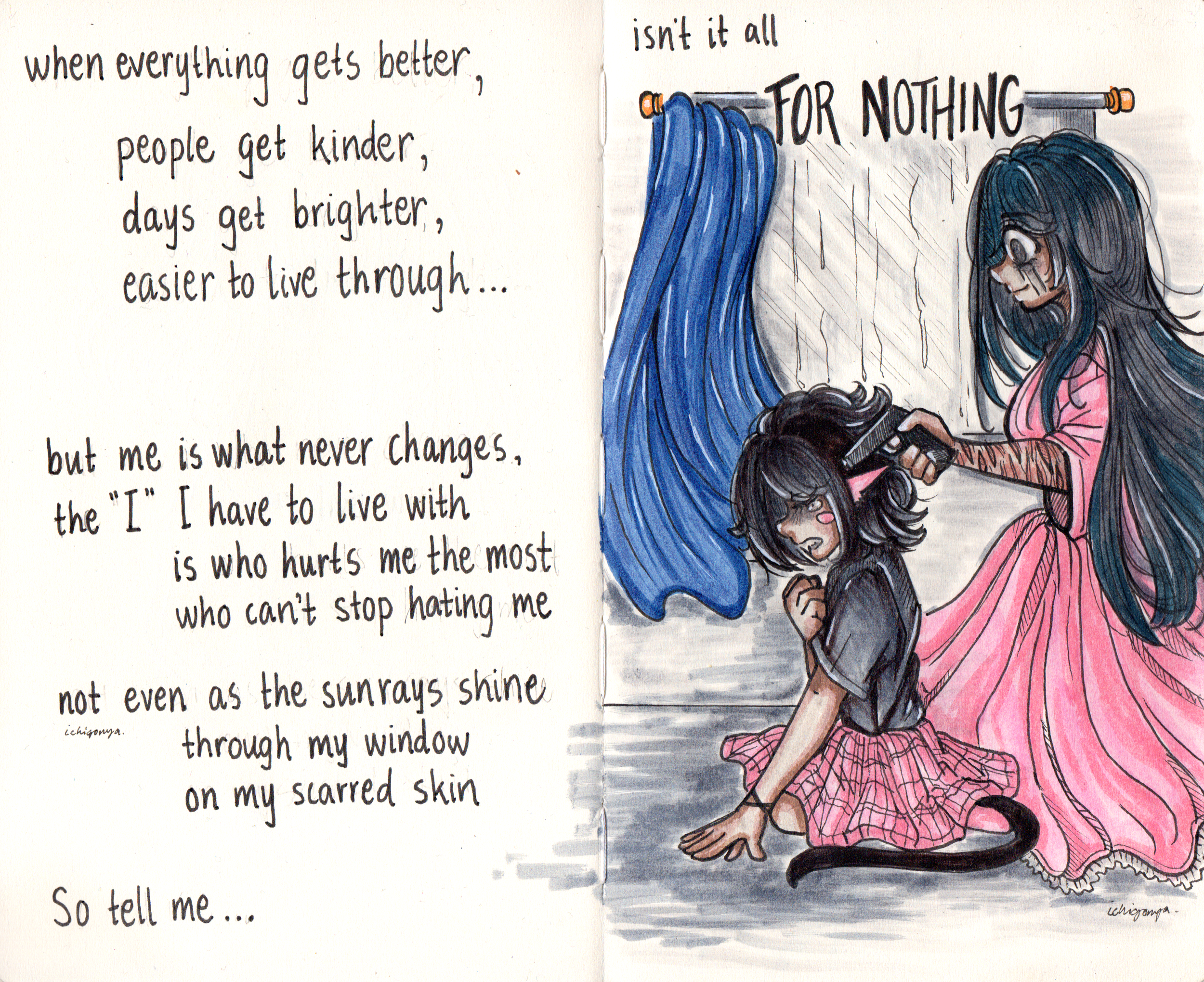Biggest Enemy
Trauma is the root of all of my suffering in this life. Sometimes people, especially those who have had the fortune of not having a traumatic childhood, don’t really grasp the extent of what trauma really is and how it affects the traumatized. You might have the misinformed understanding that trauma is something you consciously think about after it has happened. For cases of acute traumatic events, this is part of the symptoms someone might experience once some time has passed from the event. For example, losing a loved one is a traumatic event that might keep playing in your mind, especially if you witnessed their death. The same can be said about such things as natural disasters.
Childhood trauma, on the other hand, is what we usually consider something called complex trauma. Complex trauma refers to several traumatic events that happen over the timespan of at least multiple months, typically multiple years. These events might not be traumatic on their own, meaning that if you experience them off-handedly, when it is not a pattern, they most likely won’t cause you post-traumatic symptoms. But when these things continue on and on, for example being intimidated by a peer of yours with threats of violence, they impact your sense of safety and security, which is crucial for the healthy development of a child.
People who have complex childhood trauma aren’t thinking about the singular events that happened to them years ago in the same as someone with acute trauma might. Because the impact of those events is not reliant on the individual instances of them happening to you, but them becoming a pattern, a repeating experience, normalized living conditions. When your sense of safety is constantly threatened by manipulation, exploitation, abandonment, neglect, and violence, your everyday life becomes a task of survival. And that, in turn, leads to impaired development of the personality and cognition, whose complications are illnesses like borderline personality disorder.
⋅•⋅⋅•⋅⊰⋅•⋅⋅•⋅⋅•⋅⋅•⋅∙∘☽༓☾∘∙•⋅⋅⋅•⋅⋅⊰⋅•⋅⋅•⋅⋅•⋅⋅•⋅
Today, the biggest changes my trauma has done to me are the ways I see myself. One of my nurses said to me last year, that I didn’t just have a poor self-esteem – I had no self-esteem to begin with. My abusers took all of my self-worth away from me, they destroyed every gram of respect I had for myself – for their own enjoyment. My identity is made of fragmented and shattered pieces of what could have been a beautiful glass vase covered in paintings of flowers and strawberries. I don’t know myself, and neither does anyone else, because the chance to get to know the real me only lasted for nine years of my life, if even that.
I don’t spend my time going over the individual words my Friends hurled at me on the regular. I don’t make the conscious decision to wallow in self-pity and feel sorry for myself because of everything that was done to me. The very few spoons I have left after using the majority of them to mundane tasks like getting out of bed and eating are spent on something I choose to go for. That is, unless I come across something that sets my trauma ablaze, and my entire day is ruined by triggers.
But complex trauma is not about the conscious but about the subconscious. My mind is always hung up on the subconscious effects my trauma has had on it, because the two can never be separated from one another. And the biggest and most common thing I’m ruminating on without being aware of it is the astounding amount of hatred I have for myself.
deadend.
The world has taught me to hate myself since I was mistakenly allowed to enter it. Every community, every group outside of my immediate family, class, hobby circles, Friends…all of them have managed to instill the hatred they had for me into me so deeply that I don’t even think about it anymore. I have long accepted that this is the way I am to live my life, and the thought of being able to say that I don’t hate myself anymore is one I haven’t given the time of day in years. No matter what happens, if things get momentarily better, if I meet up with my loved ones, if a stranger online tells me my art has touched them somewhere, I will never stop hating myself. And that is my biggest problem, biggest flaw.
I’ve been talking about my lack of secure identity and personhood on this blog for the past four months by now. This has been so far the longest-running CHAPTER of the project, the one with the most complicated feelings and associations. There are still things I have left untouched in my journey of finding out who I have become, but I have to leave them for another occasion. It is time to finally move on.
So I wanted to end things off by saying this: I think one of the biggest parts of my identity today, in the aftermath of abuse, trauma, chronic illness, and disability, is my unwillingness to let go of self-hatred. Because nothing else has made any sense to me, nothing else has been as constant in my life as people around me telling me to hate every fiber, every molecule of my being, and me internalizing that hatred as who I am, who I have always been, what I am worth. Even when the Lover is looking at me with their tender eyes, holding my hand and whispering to me the sweetest things I have ever heard anyone say to me, I smile and try to forget, but I can’t. Because forgetting hating myself would be the same as forgetting who I am.
And I already don’t know a ton about that, so what choice do I have? Who knows.
With reluctancy,
ichigonya
⋅•⋅⋅•⋅⊰⋅•⋅⋅•⋅⋅•⋅⋅•⋅∙∘☽༓☾∘∙•⋅⋅⋅•⋅⋅⊰⋅•⋅⋅•⋅⋅•⋅⋅•⋅
